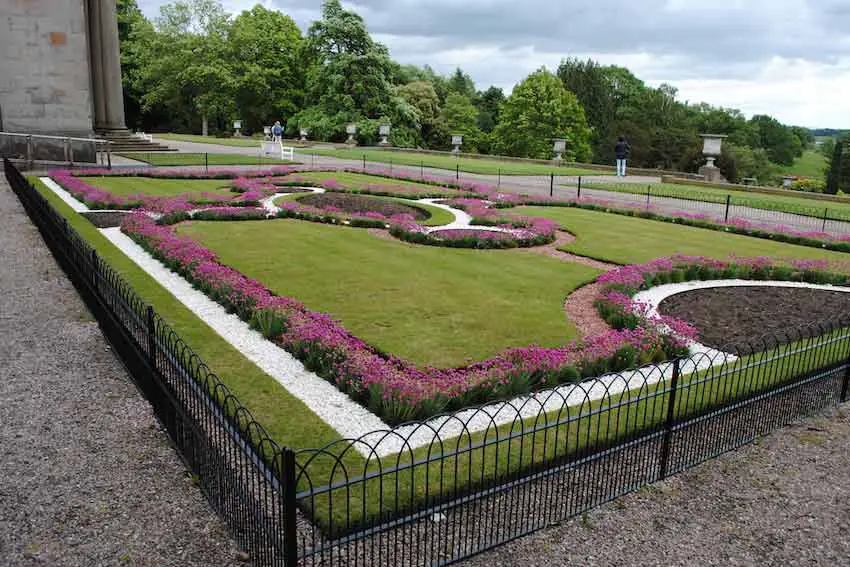Who doesn’t love to have a long-lasting garden barrier e.g. weed type? Well, when talking about the longevity of garden barriers or edging the name that comes to mind is the metal barrier for gardens, right?
Metal landscape edging is very durable, tailored, and quite black dress to the garden. It staples the garden and keeps the curvature of the garden borders. This also prevents soil erosion and provides aesthetics to the garden.
Here, we’ll discuss several types of metal barriers or landscape edging and how to install a metal barrier for your garden. Let’s move on!
Benefits of Metal Landscape Edging

Is metal lawn edging any good? Yes, the metal garden barrier has some remarkable features like the wood garden barriers that make it superior to others. Let’s reveal them.
- Separates garden beds clearly from grass, paths, or driveways.
- Prevents soil erosion thus keeping the garden in the right shape.
- Free from rot and don’t get brittle in cold weather.
- Lasts longer and requires less maintenance.
- Won’t fly away or displace due to wind, rain, or harsh weather.
Types of Metal Barriers for Garden
Metal edging for gardens may be different types but aluminum and steel are two widely used ones. Each of them has its own pros and cons. Iron is another type of metal barrier but is used less often compared to the first two.
Aluminum Metal Edging
Aluminum is the most pliable and flexible on the list. Gardeners choose this where plants grow untamed and gardeners want to create some boundaries among the plant variety. For garden beds, aluminum will suit best because you can easily bend and confirm it to get the desired curvature of the edging. It can be used for round or spherical landscape designs.
Aluminum garden edging is also the most affordable option among the three-metal garden barrier. So, if you have a large garden and you want to opt for the metal garden barrier, aluminum will be your right choice. And, heavy-gauge aluminum is highly recommended as it doesn’t rust.
Steel Metal Edging
If you look for the strongest metal edging, steel will be the perfect option. Several flower beds are intentionally kept separate for better flower growth, in this case, steel garden edging will work well. This creates a clear horizontal boundary from one variety of flower plants to another.
Steel edging provides a straight, trimmed, and modern landscape to the garden. It’s an expensive option and non-flexible. Corten steel edging is a popular choice for gardeners.
Iron Metal Edging
Among the three metal edging materials, iron is the least favorite as it’s not flexible as aluminum nor as strong as steel. It’s also heavy enough and thus harder to install. Moreover, iron tends to form rust quickly which also adds some maintenance costs. If you love old and rustic look gardens then you will appreciate cast iron garden edging, right?
How to Install a Metal Barrier for Your Garden?
The metal garden barriers come in long strips (which is good for rabbit barrier) typically 8 to 10 ft long that are overlapped. And their standard height varies from 3 to 5 inches from where you have to choose how much protrusion you need actually over the soil.
It’s also recommended to creep grassroots and sink the metal barriers 2 to 3 inches in the ground. After that, use mulch or gravel above the ground. So, let’s know how to install metal landscape edging step by step.
Step 1: Prepare the Ground
Firstly, cut the lawn turf using a spade or half-moon blade to get a clean border face to place the edging. A good look at the edging largely depends on how nicely you prepare the border.
Step 2: Place and Tap the Metal Edging into Position
Place all the edging sheets in the borders and tap them to submerge a bit in the ground. You may need a rubber mallet or wooden hammer to drive the metal edging into the earth. Do this for all the sheets and make them leveled with the turf.
Step 3: Join all Panels and Bend into Shape
Now attach all the edging panels together. You may need to drill and screw them. But if there are pre-drilled holes, you can fix them just by screwing. So, after joining all the parts now it bends well and turns into a good shape.
But some metal edging kits recommend using some anchoring posts to hold the sheets in the ground well. In this case, fix the edging sheets with the posts. So, the metal barriers are installed on the ground rightly. Now, you can add soil, stone, and gravel to add aesthetics to the metal edging as well as in your garden.
The following video explains the quick installation of the metal barrier.
Aluminum Vs Steel Landscape Edging
Here we’ll break down the difference between steel and aluminum garden edging.
Several benefits of steel garden barriers are-
- Provides solid landscape edging that protects the soil erosion.
- Last longer and needs less maintenance.
- Looks elegant so gardeners prefer this well.
Some of the benefits of aluminum garden edging are-
- Flexible and resilient allow for making curves and straight landscape edging.
- Never form rust, corrode, crack, or brittle.
- Inexpensive than steel garden edging.
- Lightweight so easy to work with.
Is Metal Edging Better Than Plastic?
Now, we’ll compare metal and plastic edging so you get a clear idea of which one is perfect for you.
Durability
Due to the metal structure, metal edging is more durable and lasts longer than the plastic garden barrier. Metal will also provide solid garden bed edging.
Installation
Although heavy, still metal edging allows quick installation. Metal edging is available in ready to use. But plastic needs some extra effort like anchoring in the ground.
Cost
In terms of price, plastic landscape edging is much more affordable than metal. But, metal is undoubtedly a better choice for superior performance.
Aesthetics
Plastic edging might be less attractive due to its cheap and flimsy nature. However, plastic edging is available in multiple colors which is definitely a good point for gardeners.
How Much Does Metal Landscape Edging Cost?
Metal garden barriers are more expensive than plastic or board landscape edging products. However, due to longevity metal barrier is still an economical option. Depending upon edging thickness, brand, and quality metal edging prices may vary between $2.50 to $6.50.
Some of the prominent metal edging brands are Permaloc for aluminum; Col-Met and Ever Edge for steel edging; and Sure-Loc, which manufactures both steel and aluminum lawn edging products.
Where to Buy Metal Garden Edging?
Metal and steel barriers are available in landscape suppliers, home improvement stores, and online. Amazon is a trustworthy platform to buy items online nowadays.
If you look for quality metal barriers it’s recommended to get galvanized steel edging, heavy-duty metal lawn edging, decorative metal garden edging, black metal landscape edging, commercial grade steel landscape edging, etc. Here are several garden metal barriers suggestions for you.

Frequently Asked Questions on Metal Barrier for Garden
Which type of metal edging is right for my garden?
It depends on the soil quality. If the garden soil is soft enough then aluminum edging will accommodate best. On the other hand, steel and iron are perfect for more complex surfaces. Alternately, we can say, when you need a flexible and customized metal barrier for the outside garden choose aluminum there, whereas steel and iron will be ideal for straight and classic garden borders for big animals like dogs.
How long does metal edging last?
This largely depends on the quality of the metal edging. Usually, 6 mm steel barriers last more than 25 years whereas 3 mm steel edging will survive at least 20 years.
Are there any risks of using metal barriers in the garden?
Like every good thing, metal barriers have some level of danger. For example, thin and sharp borders might pose a tipping hazard that could cause injury.
Will steel landscape edging rust?
This could be a common problem for steel lawn edging. Manufacturers add anti-rust powder coating (usually black, brown, or green colors) on the steel edging, but this flakes off over time. Thus, metal barriers tend to form rust after several years.
Conclusion
Metal barrier for garden is a long-term investment for the garden. It extends the beauty and retains the soil in place. Metal edging doesn’t require much maintenance. So, depending upon the soil type choose either aluminum or steel edging. The initial cost is quite high for metal garden barriers but you’ll be the winner in the long run.

I’m Shofi, a passionate gardener and blogger. I have 10+ years of experience in gardening and hold certifications in horticulture and garden design. I share my knowledge and skills through my garden blog to inspire and educate others on the joys of gardening. I try to provide valuable information and create a community for gardeners of all levels to connect and learn. My ultimate goal is to inspire others to start their own gardens and connect with nature.
